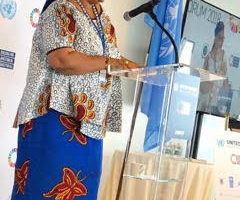A month ago Sudan’s pro-democracy movement was battered and in disarray. Protesters were in hiding after paramilitary troops rampaged through the main protest area, looting, raping and shooting dead scores of people. The internet had been shut down. Bodies were being dredged from the Nile.
Then this week the protest leaders and their military foes did something unusual: They sat down in the same room, face to face, and within two days hammered out a power-sharing deal to run Sudan until elections can be held in just over three years.
Although the details are still being finalised, the agreement offers the people in one of Africa’s largest and most strategically important countries the fragile hope of a transition to democracy after 30 years of dictatorship under former President Omar al-Bashir, who was ousted in April.
The protest leaders involved in the negotiations did have to make a significant concession: An army general will run Sudan for the first 21 months of the transition, followed by a civilian for the next 18 months. But many had been sceptical the military would share power at all. Now, the ruling council will have five civilians, five military leaders and an 11th member jointly agreed on.
While African Union mediators brokered the final power-sharing deal, the agreement was set up by a momentous week of raw street power driven by public rage at military brutality and a round of intensive backroom diplomacy brokered by an unusual coalition of foreign powers that had previously been at odds over the fate of Sudan.
The agreement started to take shape at a secret meeting.
Diplomats from the United States, Britain, Saudi Arabia and the United Arab Emirates convened Sudan’s military and protest leaders for their first meeting since the military led the June 3 massacre in which at least 128 people were killed, according to doctors.
Until then, the Saudis and Emiratis had openly backed Sudan’s military in its standoff with the civilians, apparently worried the revolution could set a dangerous precedent for their own autocratic rule. US and British officials openly supported the protesters and their push for democracy.
But last Saturday, the diplomats came together to host a secret meeting at the Khartoum mansion of a Sudanese tycoon, a gathering aimed at breaking the ice between two sides whose differences were written in blood.
Tensions were high. Protest leaders found themselves sitting opposite Gen Mohamed Hamdan Dagalo, the paramilitary commander accused of ordering the vicious rampage through Khartoum on June 3 that traumatised the protest movement. In the weeks since then, Dagalo has become a focus of protester hate, even as his troops have spread out across the city to underscore his growing authority.
Western and Sudanese officials, who could not be identified because of the sensitive nature of the negotiations, provided details of the meeting, which was first disclosed by the US envoy to the region, Donald Booth, in an interview with an Emirati newspaper Monday.
The sudden interest of the Saudis and Emiratis in bringing the two sides together was prompted by Dagalo’s brutal tactics, which apparently went too far even for two countries that have faced a barrage of criticism for the conduct of their own forces in Yemen.
They also realised, according to a Western official, that too many Sudanese had turned against Dagalo, forcing the Gulf states to back a more diplomatic approach while maintaining their support for the military.
Until recently, the Saudi and Emirati rulers had openly backed Sudan’s generals, pledging $3 billion in aid to help bolster their forces. The Saudi crown prince, Mohammed bin Salman, and his Emirati counterpart, Mohammed bin Zayed, had welcomed Sudan’s generals in their capitals.
The Saudi and Emirati rulers were also driven by a desire to protect their war efforts in Yemen. Since 2015, Dagalo has commanded a large force of Sudanese soldiers who are fighting on the side of the Saudi-led coalition against Yemen’s Houthi rebels.
But as the death toll rose after the massacre in Khartoum in early June, Saudi and Emirati officials claimed to be aghast at suggestions that they had greenlighted the violence. They quietly joined Western diplomatic efforts to find a negotiated solution to the crisis.
While the meeting at the businessman’s house brought the two sides together, it was not guaranteed to succeed. The meeting broke for a recess, and before it could reconvene, Dagalo’s troops raided opposition offices in Khartoum. All bets were off again.
But the following day, a stunning display of people power changed the dynamic.
Hundreds of thousands of people — by some estimates as many as 1 million — filled the streets of Sudan on Sunday, for the first time since the bloodshed June 3, in a cry of anger against military dominance. Western officials said that Sudan’s generals were taken aback by the size and intensity of the crowd.
At least 11 people were killed, but the show of popular support demolished claims by the generals that the protests were waning or appealed only to a fraction of the population. Dagalo was forced to talk.
On Wednesday, protest leaders agreed to drop their preconditions and open a 72-hour window for talks, several officials said. The talks were limited to the status of the transitional council.
In the early hours of Friday, the African Union mediator, Mohamed El Hacen Lebatt, announced they had come to a deal. A cacophony of car horns erupted across Khartoum as residents celebrated in the streets, relieved the crisis had abated, at least for now.
The full details are yet to be codified in a written agreement, which is still being drafted and is expected to be signed early next week. Western and Sudanese officials say they expect that the leader of the transitional council, Gen Abdel-Fattah Burhan, will be appointed as Sudan’s interim leader.
A technocratic government will be appointed to work under the ruling council, but previous proposals for a civilian-dominated legislative body have been shelved.
Much is still unclear. The military has not yet said when it will restore internet access, a key protester demand. There is confusion about whether a promised impartial investigation into the June 3 killings will be conducted by an African Union human rights body or a local Sudanese one.
It is uncertain what will happen if the investigation implicates Dagalo in the killing, an outcome that could potentially throw the political process into turmoil. His troops have reduced their visibility on the streets of Khartoum in recent days, but few doubt he remains firmly in control.





















